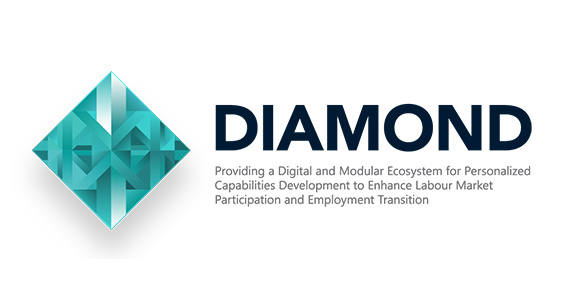The main goal of DIAMOND Empowerement – Funded by the European Union is to guide individuals from vulnerable socio-economic backgrounds on their pathway to employment, by tailoring learning programmes to individual needs and bolstering employability.
The objectives are enabled by a vibrant research and innovation environment – the Grassroot Living Lab. State-of-the-art social innovation experiments, iterative research and stakeholder-integrated co-creation will validate the DIAMOND solutions. DIAMOND directly targets the main impact goals associated with the call.
The EGROW Index will help individuals to assess their employability growth and to empower them to self-manage their skill development on MOVEE. The increased engagement due to tailored learning programmes will facilitate increased labour market participation. The economic analyses and models provide an improved understanding of macroeconomic effects.
DIAMOND contributes to inclusive growth, reduced vulnerabilities and strengthened economic resilience due to its person-centred and data/technology-driven grassroot approach.
Project Funded by the EU: European Research Executive Agency (REA) — 101178081 — DIAMOND — HORIZON-CL2-2024-TRANSFORMATIONS-01
Consortium Members
Aarhus Universitet (1/AU) – Denmark: https://mgmt.au.dk/ Aarhus BSS
Since its founding in 1928, Aarhus University (AU) has grown to become a leading public university with international impact and reach across the entire research spectrum. This breadth gives the university a strong vantage point from which to combine disciplines in the creation of research breakthroughs, and to establish close collaboration with many sectors to the benefit of society as a whole. AU is consistently ranked as one of the world’s top universities. It was ranked number 69 in the latest Shanghai ranking and is among the world’s 100 best universities in 18 out of 48 subjects in the latest QS World University Rankings by Subject. AU has around 38,000 students, 10,700 employees, 1,800 PhD-students and close to 1,000 postdoctoral scholars. Internationalisation is at the heart of AU’s mission and activities.
Coordinator: Associate Professor Mirja Hubert Co-Coordinator: Professor Marco Hubert
Team: Teaching Associate Professor Camilla Kølsen Petersen; Associate Professor Lukas Esterle.
Freie Universität Berlin (2/FUB) – Germany https://www.fu-berlin.de/en/
Freie Universität is a full-spectrum university, comprising twelve departments and three Central Institutes that together offer more than 150 different academic programs in a broad range of disciplines. Charité – Universitätsmedizin Berlin is the joint medical school of Freie Universität Berlin and Humboldt-Universität zu Berlin.
FUB’s research team includes experts on quasi-experimental research methods and econometric analyses in the field of labour and family economics using survey and administrative data. FUB applies state-of-the–art skill programme evaluation techniques for causal identification with multivariate regression methods; working with survey and register data, cross–sectional and panel data; and international expertise.
Universidad de Burgos (3/UBU) – Spain: https://www.ubu.es/
The University of Burgos is a public university, recognised as one of the best young universities in the world, which carries out its mission based on the provision of comprehensive and quality teaching, very close to the student and focused on internationalisation. Founded in 1994, UBU is already a benchmark for Spanish university research and knowledge transfer to the business world. Recognised by the Ministry of Education as a Campus of International Excellence, it belongs to the European university project EMERGE, together with 7 other universities on the continent.
Rheinisch-Westfälische Technische Hochschule Aachen (4/RWTH AACHEN) – Germany: https://www.rwth-aachen.de/
RWTH Aachen University is one of Germany’s “Universities of Excellence” and enjoys a high international reputation in research and teaching. The dynamic, creative, and international environment of RWTH is characterized by strong networks, institutionalized collaborations, and the innovative RWTH Campus. The Faculty of Business and Economics takes an interdisciplinary approach to research and teaching, and its degree programs are AACSB accredited. The research groups in Computational Economics and Management Science focus on developing efficient algorithms to analyze problems of optimal decision-making in Economics and Operations Research.
Universität Wien (5/UNIVIE) – Austria: https://soko-psy.univie.ac.at/
Founded in 1365, the University of Vienna is the oldest university in the German-speaking world and one of the largest in Central Europe. It is associated with 16 Nobel Prize winners and has been the academic home of many figures both of historical and academic importance. The University of Vienna is the largest teaching and research institution in Austria University of Vienna, and it is consistently highly rated in international rankings: it currently ranks 11th among the most international universities in the world and is the top-ranked University in Austria (Rank 124) in the Times Higher Education University ranking.
Centre d’Excellence en Technologies de l’Information et de la Communication (6/CETIC) – Belgium: https://www.cetic.be/
CETIC‘s mission is to support regional economic development by providing the most innovative results from applied research in Information and Communication Technologies (ICT) and Digital Technologies. CETIC helps companies that develop software and IT tools to integrate promising emerging technologies into their new products, processes or services more quickly, allowing them to innovate faster, reduce risks, remain competitive in their market and develop new ones. CETIC’s innovations take shape through cutting-edge expertise, the response to global technical challenges, and the development of specific IT tools, all of which can be transferred to companies active in their respective fields of application. This expertise is constantly strengthened through multiple collaborations at both European and regional levels.
Immersion (7/IMM) – France: https://www.immersion.fr/
Immersion has been a pioneer in virtual reality since 1994, creating immersive and collaborative workspaces. The company specialises in selecting, inventing, patenting, and distributing cutting-edge technological solutions. With a multidisciplinary team bringing diverse expertise, Immersion acts as a catalyst for innovation, excelling in virtual and augmented reality while designing spaces and interfaces.
The company integrates immersive and interactive systems, including headsets, large image walls, and collaborative tables. It is also the developer of Shariiing, a software solution tailored for presentations and collaborative work. In addition, Immersion creates mixed reality applications and actively participates in national and European research projects, along with conducting user studies.
European Centre for Economic and Policy Analysis and Affairs (8/ECEPAA) – Belgium: https://www.ecepaa.eu/
ECEPAA is an independent non-profit organisation founded on the idea that research-based policy-making is vital for European societies. Established in Brussels in 2011, ECEPAA intends to carry out policy-oriented research and development assistance projects, specialising in questions of European migration policy, lifelong learning programmes, and the global economy. ECEPAA’s primary focus lies in social inclusion, education, youth, and migrant issues, demonstrating a dedicated commitment to advancing our comprehension of the challenges confronted by marginalised communities.
Leveraging funding from diverse programmes, the organisation seeks to systematically counteract social exclusion and surmount persistent obstacles rooted in economic, cultural, class, race, and gender determinants.
Evolutionary Archetypes Consulting SL (9/EA) – Spain: https://ea.consulting/
EA is an innovation research and science communication company. EA explores and assesses innovation strategies, resources, and technologies to empower future game changers. With innovation research, they study and analyse knowledge that can inspire innovators and entrepreneurs to innovate and succeed. With science communication, they take encouraging insights from scientific and technology research and share the knowledge in everyone’s words. Horizon Europe collaboration allows them to get involved directly in R&D projects supporting the researchers with technology and resources.
Proportional Message Associacao (10/PM) – Portugal: https://proportionalmessage.eu/en/
Proportional Message supports people with disadvantaged backgrounds through the development of humanistic educational values, representing a way of enhancing the integral development of the individual, both personally and collectively.
PM develops education and training activities to improve the level of key competencies and skills of disadvantaged people to promote their social inclusiveness. PM works on planning, implementation and evaluation of socio-educational projects with human resources, with a strong partnership between the local enterprises, regional stakeholders and policymakers. PM is dedicated to addressing global challenges, including poverty, social and labour inequalities, education, environmental sustainability, peace, and civic engagement.
Ente Morale Giacomo Feltrinelli per l’incremento Dell’Istruzione Tecnica (11/EMiT) – Italy: https://www.emitfeltrinelli.it/ente-morale-emit-feltrinelli/
EMIT Feltrinelli ETS is an Italian historical non-profit Foundation and Training Center, based in Milan. It has been a major player in the training and innovation of firms and private people since 1908. Its training courses are focused on digital, technical and managerial skills, mainly in IT, web technologies, languages, marketing, management and creative techniques. EMiT is also committed to helping young people and vulnerable groups in search of job opportunities to enhance their skills in order to meet companies’ needs, be more competitive in the labour market and to reach their rights as citizens.
Deinde Spolka Z Ograniczona Odpowiedzialnoscia (12/DEI) – Poland: https://deinde.pl/en/
DEI is a training institution and employment agency that operates in the areas of vocational education and training, career counselling, social inclusion, and lifelong learning. DEI aims at vocational activation and social inclusion, restoring unemployed people to the labour market, and helping younger people (most often after completing their education stage) to enter the labour market. In recent years, DEI has provided its target groups with training and courses in topics, such as literacy skills, digital skills, entrepreneurship, personal and social competencies, the standard SA8000 and environmental protection, CSR and the 2030 Agenda, gastronomic services, to name a few.
Fundacja Obiektywna (13/FOB) – Poland: https://obiektywna.org/
Since 2018, Fundacja Obiektywna focuses on socio-professional activation, financial education and addiction prevention. Foundation implements projects for various target groups: children and youth, the unemployed, people with disabilities, those facing homelessness, addicts, victims of violence, the incarcerated or recently released, single parents, refugees and seniors. The Obiektywna’s team is made up of various specialists: psychologists, psychotherapists, lawyers, social workers, financial educators, addiction preventionists, career counsellors and job brokers. Foundation is also active in the social dialogue committee on homelessness in Warsaw which has a strong influence on the decisions of the city authorities and formation of policies to fight homelessness.
Youth Power Germany EV (14/YP) – Germany: https://yp-de.org/
YP is a non-governmental and non-profit organisation working to empower young people, especially those facing social and cultural challenges, including migrants. YP has a pool of experts, youth workers and trainers who are delivering different programmes focusing on the inclusion of young people with fewer opportunities and have valuable experience with digital tools in youth work, like e-learning courses. YP has experienced professionals (psychologists, sociologists, social workers, etc.) as members, coordinators, and volunteers, who all have the needed expertise and experience in exploring and adapting new methodologies for inclusion and employability of marginalised groups, and whose expertise is also doing professional research and studies.
Fundación Miradas (15/FM) – Spain: https://fundacionmiradas.org/
Fundación Miradas is a national organisation created in 2013 by Autismo Burgos (Spain) but based in Burgos, that provides support for the legal capacity and defence of the rights of autistic people and their families, focusing also on improving their quality of life.
Fundación Miradas develops different initiatives that promote awareness, knowledge, study and research on autistic people and their families. In 2015, alongside the University of Burgos, Fundación Miradas created the Miradas por el Autismo Chair, the first project to focus its attention on autistic people and their families in Spain.

















